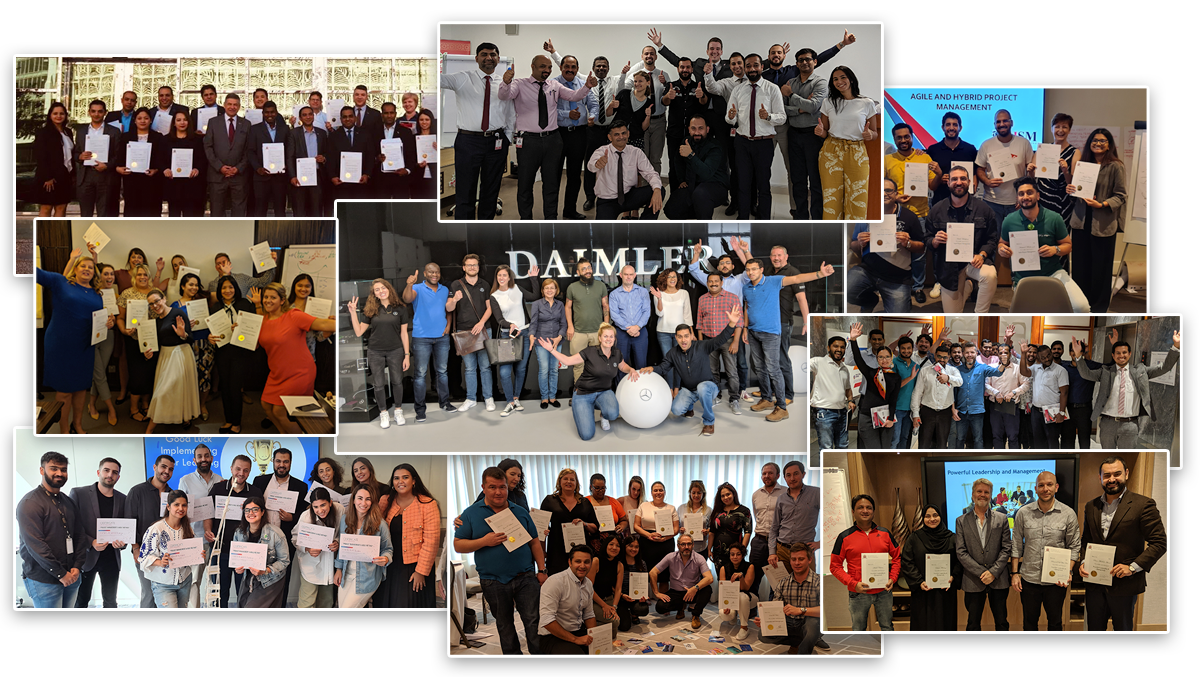What is Emiratisation?
Emiratisation is a plan created by the UAE government to increase the number of Emirati citizens working in private sector jobs.
For many years, most jobs in private companies were held by expatriates. This made it harder for UAE nationals to find opportunities outside of government roles.
The goal of Emiratisation is to build a stronger and more balanced economy by including more Emirati talent in all areas of work. It is part of the UAE’s long-term vision for economic growth and green living.
With new laws, hiring targets, and programmes like Nafis, Emiratisation is already bringing change to industries such as:
- Banking
- Healthcare
- Technology
- Logistics
But while there are many benefits, both companies and Emiratis face some challenges in making this initiative truly successful.
Why Trust ISM Training?
Over 20,000+ graduates
Have advanced their career with ISM Training
89%
of ISM graduates say our course helped them get a promotion.
76%
said that their training helped then increase their salary.
97%
of graduates want to study more of our courses.
Our graduates are working in some of the biggest companies worldwide, companies like...






Benefits of Emiratisation
Emiratisation offers real advantages for both sides—businesses and Emirati job seekers. Let’s look at the benefits in more detail.
For Employers
Access to government incentives.
When companies meet their Emiratisation targets, they can receive support from the government. This includes:
- Reduced fees for government services
- Access to grants
- Help with training costs
Programmes like Nafis make hiring Emiratis easier and more affordable.
Stronger reputation
Hiring Emiratis shows a company is committed to national goals. This improves how the business is seen by the government, customers, and local partners.
It is also a smart move for companies that want to build trust and goodwill in the UAE and the wider GCC region.
Better local understanding
Emirati employees bring valuable knowledge about local customs, traditions and customer needs.
This can help businesses grow, especially in areas where strong cultural awareness is important—like real estate, finance, or healthcare.
Staying ahead of rules
The rules around Emiratisation are becoming stricter, with bigger penalties for companies that do not meet the required hiring targets.
Hiring Emiratis now helps businesses stay compliant and avoid fines. It also shows that a company is forward-thinking and ready for the future.
For Emirati job seekers
More career opportunities
With a historically high percentage of Emiratis in UAE government jobs — often cited as the majority of the national workforce — Emiratisation is helping open more career paths in the private sector.
Now, more doors are open in exciting sectors like technology and logistics.
Emiratisation changes the workforce in the UAE. Currently, job seekers believe that it is easier to find a job in the private sector than the public sector.
Interestingly, 54% of people are open to moving to the private sector from the public sector.
Help with training and career growth
Government programmes like Nafis offer training, job-matching, and career development support to Emiratis. This helps job seekers build the skills they need to succeed and grow in the private sector.
Read our guide to Emiratisation training to find out more about exciting opportunities for Emiratis.
Financial support
To encourage Emiratis to work in private companies, the government provides financial help. This includes temporary salary top-ups and child support grants, making the transition to private work easier for families.
Sense of purpose
Private sector jobs give Emiratis the chance to contribute directly to the UAE’s economic success. It’s not just about personal growth—it’s about making a difference and helping build the country’s future.
Challenges of Emiratisation
Even though Emiratisation brings many benefits, it also comes with some challenges for both employers and Emirati job seekers.
For Employers
Limited talent pool in some fields
In certain industries—especially in technical or specialised jobs—it can be hard to find enough qualified Emirati candidates. This slows down the hiring process and makes it harder to fill key roles quickly.
Salary expectations
Some Emirati candidates expect higher salaries or more benefits than what smaller companies can offer. This makes it difficult for small or medium-sized businesses to compete with large firms or government jobs.
Cultural and communication differences
Some companies struggle to bring Emirati employees into their teams because of different work styles, expectations, or ways of communicating. This can lead to misunderstandings and make it harder to keep new hires.
Difficulty keeping talent long-term
Many Emiratis still prefer public sector jobs because they offer better benefits and job security. Private companies must work harder to keep Emirati staff long-term by showing clear paths for growth and development.
For Emirati job seekers
Negative views about private companies
Some Emiratis believe that private sector jobs are less secure, more demanding, or offer fewer benefits. This stops many from even considering private roles, even if the opportunities are good.
Skills that do not match the job
In some cases, Emirati job seekers may not have the skills private companies are looking for. There is often a gap between university degrees and what the job really requires—especially in tech and digital fields.
Adapting to global workplaces
Many private companies are fast-paced and multicultural. Emiratis may need to improve in areas like English communication, digital skills, or teamwork to feel confident and succeed in these environments.
Lack of guidance and access
Some young Emiratis do not know what private jobs are available or how to apply for them. They may not have the right networks or career support to help them explore all their options.
Start your course today!
We offer a comprehensive curriculum that covers all of the essential topics. Our experienced instructors will provide you with the support and guidance that you need to succeed.
How to overcome the challenges
To make Emiratisation more effective, both employers and job seekers can take steps to improve how they work together.
What employers can do
Work with universities
Partner with local universities to create internship and graduate programmes. This helps students gain experience and builds a pipeline of future talent.
Offer mentorship and onboarding
Support new Emirati hires with mentors and structured onboarding programmes. This helps them settle in and feel more confident.
Invest in career paths
Show clear career growth options and offer leadership training. This keeps employees motivated and encourages them to stay.
Create a welcoming workplace
Make sure the company culture is respectful of local traditions and encourages open communication and collaboration.
What Emirati job seekers can do
Use government platforms
rogrammes like Nafis offer help with finding jobs, training, and financial support. These are great resources to start your private sector journey.
Build transferable skills
Work on your communication, teamwork, and digital skills. These are valuable in almost every industry.
Get experience early
Try internships, part-time jobs, or freelance work. Even small experiences help build your CV and confidence.
Stay connected
Attend job fairs, follow industry news, and talk to professionals. Networking helps you learn about new opportunities and trends.
We let our graduates do the talking...
The future of Emiratisation
Emiratisation is no longer just about filling quotas. It is now about real inclusion, long-term planning, and meaningful careers.
As the UAE grows in fields like AI, fintech, clean energy, and logistics, more opportunities are opening up for Emiratis to lead and innovate.
When the government, companies, and job seekers work together, the UAE can build a strong and inclusive workforce that matches its future goals.
At ISM Dubai, we deliver expert-led training programmes specifically designed to empower Emiratis in building successful careers across key industries in the UAE. Our courses are:
- Practical and easy to follow, focusing on real-world applications
- Suitable for both fresh graduates and seasoned professionals
- Aligned with the skills most in demand by UAE employers
- Specialised in areas such as business, communication, customer service, and more
- Trusted by leading companies across the Emirates
We are proud to support Emirati career growth and help move the Emiratisation initiative forward.
Get in touch with ISM Dubai today and take the next step towards your professional success.
Looking further ahead?
View our course calendar in full
Frequently Asked Questions
It is a UAE government plan to increase the number of Emiratis in private sector jobs. It helps build a balanced economy and gives locals more career opportunities.
They may receive financial help, reduced government service fees, and training support through programmes like Nafis.
Some key challenges include not enough skilled candidates, high salary expectations, cultural differences, and difficulty keeping employees long-term.
Nafis offers job matching, training, salary top-ups, and child support to help Emiratis succeed in private sector roles.
Fast-growing areas like tech, finance, healthcare, logistics, and green energy offer strong job opportunities and support.
Join 1000's of individuals and teams certified by the Institute of Sales & Marketing

Our trending courses
At ISM, we combine top-tier training courses with industry-leading instructors.
View all coursesTestimonials from Our Valued Clients
Discover the transformative experiences our clients have had with our training programs.
Hear directly from those who have unlocked their potential and achieved remarkable success.

Some other providers courses can be quite a chore! However, I felt fully engaged and excited by all the new selling tools I have...

Daniel Graham

Instead of just telling me what to do, they showed us how to do it as well as why to do it. They used real-life experiences...

Sujit Nair

The training was delivered in an easy to absorb manner and focused on all the key areas...

Paul Baker CFP



